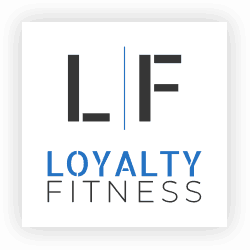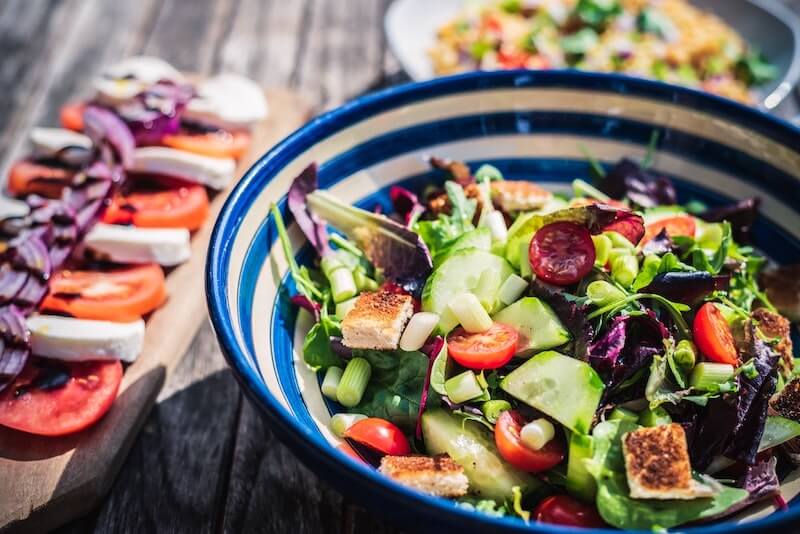One question we get a lot here at Loyalty Fitness is “Do I need to change what I eat when starting to work out?” Typically, when people talk about making lifestyle changes for their health, there are usually 2 things they concentrate on: fitness and nutrition. It’s always important to remember that these two things go hand in hand. In order to improve your overall health, you need to work on your physical fitness AND ensure that you are feeding your body the right kinds of foods to fuel and support you.
Here are 4 types of meals that can help fuel your fitness journey:
High Protein Meals
Increasing your protein intake is one strategy you can take when it comes to creating a healthier diet for strength training. There are many benefits to eating foods that are high in protein! Protein helps your body build lean muscle when combined with strength training. It can also help with weight loss since protein-rich foods make you feel fuller, which helps prevent overeating.
Adding protein to your diet doesn’t just mean eating more meat. Here are some other great sources of protein to add to your meals:
- Beans and Legumes: black beans and lima beans can add up to 21 grams of protein per serving
- Fish: provides high protein, and Salmon can offer heart healthy omega-3 fatty acids
- Broccoli, Spinach, Cauliflower and Bok Choy: protein rich, these vegetables also provide vitamins and antioxidants
- Eggs: provide you with protein, nutrients, and healthy fats, and they can be prepared in so many different ways!
Meals with the “Right” Carbs
Carbs. That one word gets a bad rap when it comes to nutrition. While some weight loss methods encourage folks to completely cut out carbs, we encourage healthy carbs—fruits and veggies! Carbohydrates are a major source of energy that your body needs, especially when starting a strength training workout. The trick is knowing which carbs are the right ones.
The key to consuming the correct carbohydrates in your diet is to identify foods with complex carbs (a.k.a. the “good” carbs) and choose them over foods with simple carbs (a.k.a. the “bad” carbs). Complex carbs contain more nutrients, fiber, and starch, while simple carbs are high in sugar and refined starches. These “bad” carbs are commonly found in many processed foods like cookies, soda, white bread, and even in many so-called healthy breakfast cereals and snacks.
Meals rich in complex carbs will not only provide your body with essential nutrients but they can also help you control cholesterol, maintain a healthy weight, and protect your body from some medical conditions such as type 2 diabetes.
Vegetables, fruits, and whole grains are the Complex carbohydrates you want to focus on. These “good’ carbs are packed with vitamins, nutrients, and antioxidants you need. A simple stir-fry with vegetables, lean meat, and quinoa is an excellent source of complex carbs and a smart way to keep your energy-level high.
Here are a few examples of complex carbs:
- Spinach
- Avocado
- Asparagus
- Lettuce
- Cucumber
- Zucchini
- Eggplant
- Green, Red and Yellow Peppers
- Cauliflower
- Tomato
- Kale
- Cabbage
- Green Beans
- Broccoli
- Brussel Sprouts
- Berries
- Quinoa
- Oatmeal
Eating for a Health Condition
Certain health conditions such as diabetes or arthritis can be greatly impacted by the foods you eat and the amount of exercise you are getting.
For those with diabetes, it’s important to watch what carbohydrates you are eating, because carbs are broken down into glucose (sugar). It’s important to add whole, unprocessed, non-starchy vegetables to your diet. These will not only help you stay full, but they are also low in carbohydrates.
Arthritis is your body’s reaction to inflammation in your body. There are several foods that can act like a trigger and cause inflammation: refined/simple carbohydrates like pasta, bread, fried foods, candy, soda and other sugar-sweetened beverages, red meat, and margarine are all major culprits. Adding antioxidant rich foods such as green leafy vegetables, berries, olive oil, nuts, and fatty fish are all great anti-inflammatory choices.
Don’t Forget to Drink Water!
You hear this all the time, but water is important no matter what kind of diet or fitness plan you embark on. It’s essential for every single function in your body! Trying to get 6-8 servings of water a day is a great place to start. Don’t forget to add water-rich foods like celery and cucumbers—they not only hydrate you, but they also provide you with fiber.
When it comes to personal training for weight loss or a focus on improving your health, the certified trainers at Loyalty Fitness are a great resource. They can help you find healthy food substitutions or create a bigger nutrition plan. Book a session at Loyalty Fitness and we can talk about options that are right for you!

